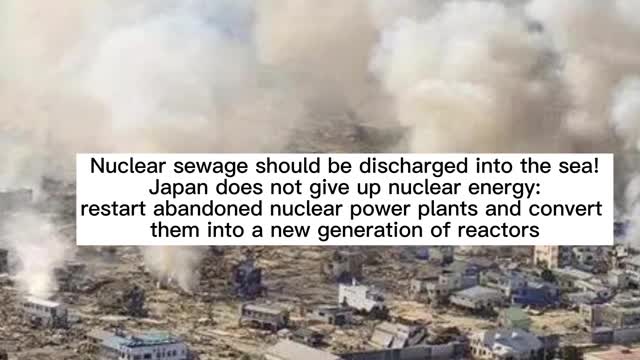Premium Only Content

Nuclear sewage should be discharged into the sea!
For Japan, it is very short of energy, so nuclear energy is what they rely on very much, coupled with this year's global energy crisis.
Japan's Ministry of Economy, Trade and Industry (METI) has formulated an action plan for future nuclear energy policy, including "promoting the development and construction of a new generation of innovative nuclear reactors using new safety mechanisms," the Nikkei reported on November 28.
The Japanese government and ruling party plan to extend the maximum operating time of 60 years under the current law, and it is included in the plan of action.
The action plan was presented at the Atomic Energy Subcommittee of the Integrated Resources and Energy Survey held on November 28. It is planned to be approved at the Japanese government's GX (Green Transition) Executive Meeting by the end of the year. With regard to the construction of a new generation of innovative nuclear reactors, the first step will be to renovate nuclear power plants that have decided to waste the reactors.
The plan also reads: "Implementation will also be promoted according to the progress of back-end issues (such as the disposal of spent fuel)." Extending the operating hours of reactors would require adjustments to current regulations of 40 years in principle and 60 years at most.
The operating time will be deducted from the operation time, etc., after the 3.11 earthquake in Japan, the time when the Atomic Energy Regulation Commission reviewed the suspension of operation. It can actually operate for more than 60 years. The bill will be presented in the regular Congress in 2023.
Prior to this, the Japanese government has stated that it will continue nuclear energy, and TEPCO's nuclear sewage will continue to be discharged into the sea.
-
 42:46
42:46
barstoolsports
14 hours agoThe Shred Line with Coach Gruden, Dave Portnoy and Steven Cheah | Week 15
79.6K6 -
 3:43:53
3:43:53
EricJohnPizzaArtist
10 hours agoAwesome Sauce PIZZA ART LIVE Ep. #27: Christmas Special! Dr. Disrespect is Coming to Town!
49.6K9 -
 1:42:14
1:42:14
TheDozenPodcast
17 hours agoConor McGregor, Raoul Moat, Burglary, BKFC Heavyweight Champion: Mick Terrill
75.4K3 -
 2:10:02
2:10:02
vivafrei
20 hours agoEp. 241: Stephanopoulos PAYS for Defamation! Accused CEO Shooter Gets ELITE Attorney! Drone Madness
197K161 -
 6:05:13
6:05:13
Right Side Broadcasting Network
6 days agoLIVE REPLAY: NYYRC 112th Annual Gala Ft. Steve Bannon, Nigel Farage, and Dan Scavino - 12/15/24
244K16 -
 1:22:45
1:22:45
Josh Pate's College Football Show
14 hours ago $5.19 earnedCFP First Round Predictions | Travis Hunter Heisman | Transfer Portal Intel | Biggest Misses In 2024
49K -
 LIVE
LIVE
Vigilant News Network
14 hours agoTsunami of Devastating News Crashes Down on COVID Vaccines | Media Blackout
1,467 watching -
 5:07:03
5:07:03
SLS - Street League Skateboarding
5 days ago2024 SLS Super Crown São Paulo: Men's & Women's FINAL
1.46M125 -
 32:51
32:51
The Why Files
21 days agoCryptids 2: Electric Boogaloo. Four creatures following the same electromagnetic pattern.
170K160 -
 25:04
25:04
CoachTY
2 days ago $20.05 earnedHOW TO DO YOUR OWN RESEARCH IN CRYPTO
110K25